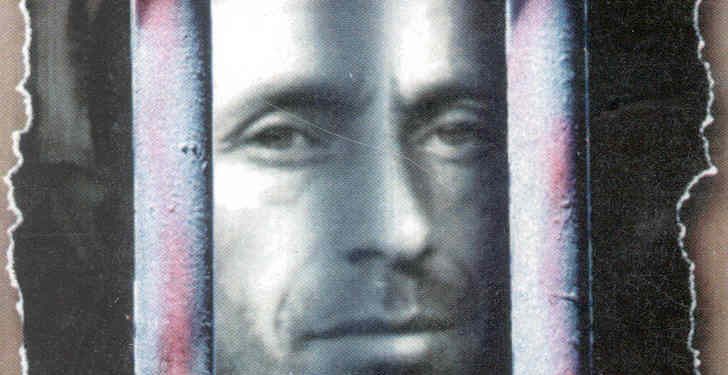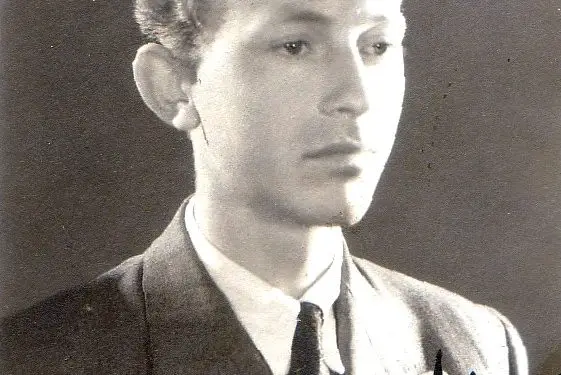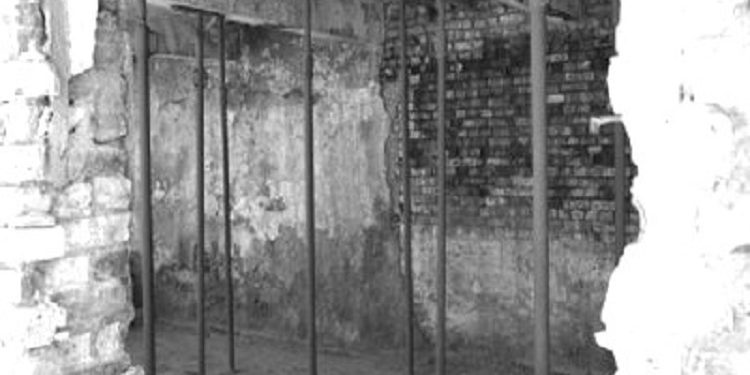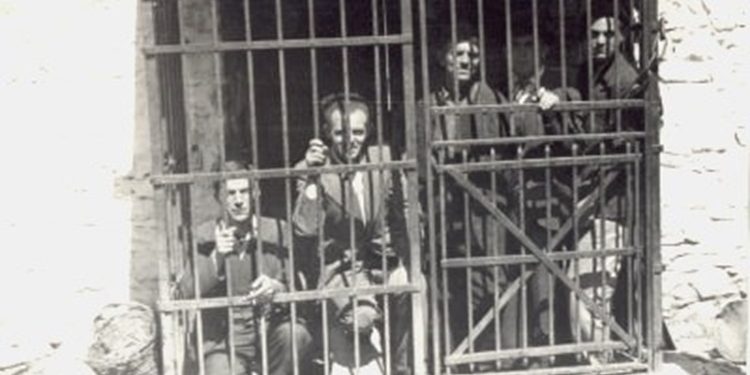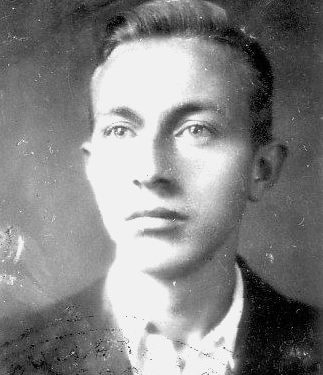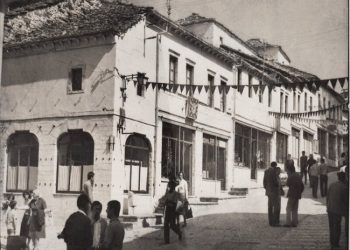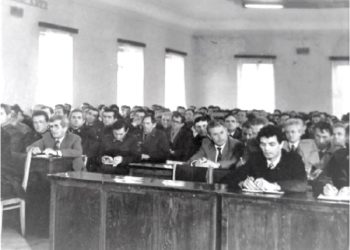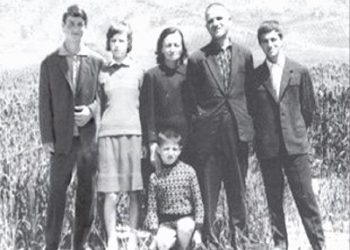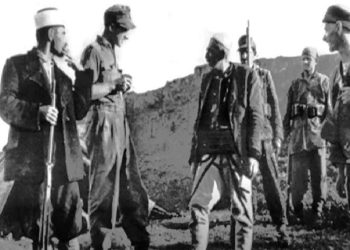By Uran Kalakulla
Part forty-seven
Nazism and communism
Memorie.al / Nazism lasted 12 years, while Stalinism 2 times longer. In addition to many common characteristics, there are many differences between them. The hypocrisy and demagogy of Stalinism was of a more subtle nature, which was not based on a program that was openly barbaric, like Hitler’s, but on a socialist, progressive, scientific and popular ideology, in the eyes of the workers; an ideology that was like a convenient and comfortable curtain to lie to the working class, to lull the sharpness of intellectuals and rivals in the struggle for power.
One of the consequences of this peculiarity of Stalinism is that the entire Soviet people, its best, capable, hardworking and honest representatives, suffered the most terrible blow. At least 10-15 million Soviets lost their lives in the torture chambers of the KGB, martyred or executed, as well as in the gulag camps and others like them, camps where it was forbidden to correspond (in fact, they were prototypes of the Nazi death camps); in the mines in the ice of Norilsk and Vorkuta, where people died from cold, hunger, from crushing labor in countless construction sites, in the exploitation of forests, in the opening of canals and during transportation in leaded wagons, or in the flooded barns of the death ships.
Continued from the previous issue
In the investigation they conducted at the Burrel Branch, among other things, they had asked about me. But Dulla (and I am sure of this) had defended me resolutely, telling those fools that I was a wise man and only engaged in studies and never talked about politics. Moreover, I did not even have the slightest thought about work, but only about my wife and little son, whom I worshipped like God and even more strongly. The second part of Dulla’s defense, of course, stood. But the first part was also convenient for me, because I did not want “praise sheets” from the fools of the Branch? Those “sheets” were an additional ten, of years in prison.
However, my caution continued as always, despite the defense of “lawyer” Dulla. That the security forces asked seven or eight questions and did as they knew how. This is exactly what I tried to guard myself against, as much as I could. And yet, trouble found me. According to my accurate calculations, my release date was January 30, 1982, after I had already served nearly 21 years in prison, 14 of which were in Burrel prison, the majority. And I had begun to count the days, as they say, by the grain of grosze. But as it turned out, the “priest’s feet” were announcing bad times.
It was the first ten days of December 1981. I was then in room no. 4 of section no. 1 of the prison. It was morning when the door opened and the inner guard called me by name to follow him. I did as he told me. I didn’t know why he was looking for me. But he, without speaking to me at all, accompanied me to the iron door of the prison entrance. At the counter I saw the prison commissioner, Andon Minxha. We were all quite angry with this man, because he played the role of the operative in the prison. Short, his surname suited him quite well. And he spoke to me:
– “During the search, the inner guard found a pair of gambling cards on your bed. For this you are sentenced to thirty days in prison”!
– “Gambling cards on my bed? I don’t do such things at all, Commissioner. And I am convinced that you know very well what I am telling you.”
– “Go, go and don’t say a word. Take it!” he addressed the guard officer who was present. That’s how I ended up in the dungeon, without any guilt. It was cold, ice crystals could be seen hanging from the windows, like stalactites in caves. Meanwhile, New Year’s Eve 1982 came and I was spending it in the dungeon. My mind wandered back in time. The twenty-first year of my imprisonment had arrived, twenty-one years of my life wasted in vain, without any moral guilt, without having harmed anyone, just because I had political, cultural, philosophical, ethical convictions that were contrary to the official ideology.
For days on end, it was showing itself to be a catastrophe badly stained with blood, with a crime against innocent people, freedom-loving, dignified, patriotic people, for whom, God, parent, child, it was the good of the entire people, of the entire Albanian nation, both here and there across the borders. Turning my head back to the past of my years in prison, I remembered that I was waiting for the New Year in a dungeon, exactly as I had waited for that day in the now distant year 1961-1962.
The New Year 1962 had been very harsh on me. It had been the year of the infamous trial, the year of the death penalty, the year of the “death chamber”. But what would this New Year 1982 bring me, perhaps? Good or bad again, like the one twenty years ago? Could it be that another trial, a new sentence, a new death sentence, this time without a life sentence? But even if this life sentence were to happen again, what would I need? A death without a real bullet, but a long, long, daily, miserable, torturous one, until I was very old, already dragging myself through the cement of the prison! And then my heart would swell with great indignation, with the revolt of the soul for the injustice towards life, for the crime that had the ugly name of the Party of Labor, State Security, communism, Enver Hoxha.
When I finally came out of the dungeon, my roommates welcomed me not only with kindness, but also with enthusiasm. And since I was closer, even with a bed, I had Dulla, the one who never waited for a word, as always he said to me: “Uran, when they put you in the dungeon, certainly without any fault at all, we all said that your work was over, they would re-sentence you. And of course, not only did we feel very sorry, but we also cried for the trouble. But now that they have returned you to your room, it seems that they have given up on that vile work and we were very happy. So, finish these days that are left for you and return to your family, to your mother, wife and son and have a good life and good luck, from now on”!
– “Thank you, Dulla”! – I returned him with a pity in my soul, moreover that such a wish was made to me by a friend who still had many years left to serve in prison, re-sentenced for the second time, destitute, like several others. Really, what would have happened to me? Why didn’t they proceed with a re-sentence? As I said, I was very careful not to give a reason, but where did the security forces ask for real facts? They fabricated the “facts” themselves, in their dark offices, like the cave of witches, sorcerers of evil, of death, helped by their servants, the prison spies, these “witnesses” always ready, although always false. These “resentment is what makes the Shahs”, as the Turk once said.
A person can attribute the events of life to bad luck, especially the bad ones, because, with conscience, with conviction and education of tradition, he believes a lot in predestination, the predetermination of man’s fate, written somewhere in a book in the hands of God. I have also accepted fate to some extent, perhaps also from the fact that the belief in predestination remained deep in man’s conscience, from the education he received in family and society. But unlike many others, as a primarily rational being that I have been, since I began to find my mind, I always sought to find the causes and circumstances of every event and how responsible I myself was, with my prudent and reckless actions, in creating these causes, if not the circumstances.
And it is precisely on this basis that I began to reason. Of course, I am not 100 percent sure that I have found the whole truth, and I still have not one, but several question marks left on my conscience. So, how did I escape re-conviction? Before they put me in the dungeon, from the loudspeaker hanging on the wall, above my head, the whole room, the whole prison, learned about the “suicide” of Mehmet Shehu, the regime’s number two. I have spoken about this fact before, in the previous pages. But in the meantime, after I returned to the room, as I came out of the dungeon, I learned from my friends that after the murder of the red and cruel prime minister, many others had been arrested, his collaborators, family members and henchmen. So from the bosom of the Party, “new enemies” had emerged, but dangerous ones.
Hey, this damn party, has it always had a belly full of snakes?! So, I thought, and Abdullai was of the same opinion, that the communists were already in big trouble among themselves, and I, oh God, should not have been hanged at all. So I escaped without being re-convicted. Was this a coincidence, or was it luck? Here I accept fate! And it is up to me to say, on this occasion, with all conviction: “Thank you and be grateful, oh God”!
The day of release
Finally, the day of release came, January 30, 1982! The night before that day, I could not sleep for hours, and only towards morning, I don’t know if I slept for an hour or two. Wherever my mind did not wander, inside the prison walls and outside it, in the so-called “free life”. But, of course, my mind was mainly on my family. I had not seen my own for almost a year: my wife and son. The woman had somehow begun to show clearly on her face the signs of fatigue, of suffering. And the boy? He was no longer that little four-year-old child, plump, handsome, with a pointed nose, blond hair and milky skin, with that sweet voice like a bird’s chirp, talkative, who spoke without stopping in the first meetings, after the forgiveness of life.
That child, who in those words expressed to me almost mournfully his childish longing, did not know that for him, I would give my life without the slightest hesitation. He was no longer the bird that, chirping loudly, tried, between the gloomy bars of the prison, or the barbed wire of the prison camp, as scared, as surprised, as curious, to talk to me, to tell me about his work, that of his family, of his mother, of his grandmother, and so on, or to tell me about his toys that he had begun to make himself, with his wet, infantile clothes. Nor was he any longer the young high school student, in whose eyes, as he sat with his head hanging behind the bars of the iron prison door, I saw a deep sadness, a great pain, which he was struggling to hide with words.
Now he was a man, over twenty years old, a worker. He was even the only male protection in the family, which was severely reduced in number, apart from his mother and his old grandmother, who were bedridden. It was not at all care and fear for himself during twenty years of imprisonment, but concern for them, for his wife and son. I was often tormented by the fear that they might arrest him too, as had happened to many sons of other prisoners. I knew from before that my wife could not come to meet me at the prison door and we could return home together.
She was not allowed to leave the city of Shkodra without the authorization of the Internal Affairs Branch. And I did not want her to go back to that damned place and pray. Moreover, she wouldn’t be able to help me carry my sleeping clothes, which were heavy and which I myself had no strength to lift in my arms after 14 years of confinement in prison. I also had the bag with the clothes and the book bag, which weighed a lot. And besides, she had to come the day before and sleep in some hotel in Burrel, which I didn’t know how it could be. A lonely woman, tired, worn out by suffering, which was no longer young. So I asked, by letter, for the boy, now a man, 24 years old, to come.
I had written to her to bring me some coffee, some candy and a few packs of cigarettes, to treat my roommates on the eve of the day of release, thus faithfully respecting a kind of tradition that had been established for years in prison, on occasions of release. And indeed, the day before, the boy arrived at the prison door where we had met. We talked a little, just to make out. And then the policeman began to check the bag with the ordered items, as was the rule. Meanwhile, the boy, driven by curiosity to see what was going on inside, had to stick his head out to the window of that iron door. The policeman saw him and rushed at him as if furious and full of threats.
The poor boy was scared and retreated, just as happens to a man when a guard dog rushes at him with barking, with its teeth bared, ready to tear him apart. My soul ached, my son, and then I turned to the policeman angrily:
– “Why are you rushing at him? Is there some big secret here? Leave him alone, he misses his father, if you understand and are a man or a parent too”! The policeman, who did not expect my intervention, stepped out, closed the window and continued his inspection work, without saying another word. Of course he would know that I was to be released the next day. That way it would be useless to turn on me, to beat me or to put me in jail. Perhaps my words did their job and the situation calmed down.
After checking the bag, the policeman opened the counter again and then I met my son. It was the last meeting with him in that gloomy and cursed place. I don’t know if he was the one I met. I had never counted them. The first meeting in prison with my son and my wife, I had had almost two decades earlier, while I was in the dungeons of Koç. Yes, in those moments, when I was talking to my son, that first and very painful meeting, how I remembered it so clearly, in almost all the details, as if I had done it yesterday, with the only difference being that my son was a four-year-old baby then and now he had become a man. Almost an entire life wasted in vain, with suffering and spiritual torture for both parties. And why?
That evening, after the usual roll call, my roommates came one after another to my bed, as was their custom, congratulating me on my release. And I treated them with what I had. And when the signal for sleep came, I fell asleep too, but my sleep had fled. What did I not think of that long night! As in a movie, images came one after another in my mind’s eye, from the moments of arrest, of the first and second investigation, and of all the dungeons where I had been lying, the trial, the death chamber, the old prison of Tirana, the first, second, third, fourth, fifth prison camp…!
And my visit to Burrel prison, entering it, the first chilling impression, the screams of the guards, the snake-like whistle of the operative, the first room no. 1, the second, third, fourth, fifth, the removed dungeons, the first meeting there with the wife and the still-young son, with the old, worn-out mother, whose eyes were filled with tears, and so on, and so on…! A sad, chilling, torturous film. And once, from fatigue, I fell asleep. But I remember well that it was a restless sleep. And it seemed to me, when I woke up from the watchman’s whistle announcing that the hour of awakening had come, that I was not feeling the joy of release, the natural joy that I would now turn my arms to that tomb of the living, where I had wasted the most valuable years of my life, the youth of a large part of my manhood.
I had entered prison still young, not to say a boy at all, with hair, with teeth, with skin still fresh, with normal physical strength. Now I was coming out old, without hair, without teeth, with a tired, weakened physique, without having done anyone, not even the whole people, any fault, without having done anyone any harm! And what awaited me from now on? No security, no guarantee that I would not come back, like so many others, to that cursed prison. But even if I did not return there, what other trouble awaited me? Any internment? I knew full well that I would never be the same as I had been before prison, not in age, appearance, strength, etc., but not in terms of civil status, citizenship.
I had been a second-, third-, and perhaps fourth-class citizen in the supposedly classless “socialist society,” but now I would be in the last category, that of the rajas, prey to all kinds of discrimination, injustice, contempt, persecution, and violence. I knew how difficult it would be to find work, even manual labor. I knew very well what kind of work they would give me, even if they did. And I would have to live (if they left me there), in a completely foreign city to me, as Shkodra was then, without friends, without relatives, except for family, without friends, without support, in extreme poverty, always with fear in my heart that I might be arrested again, when the authorities wanted, when a new campaign of arrests was launched, a common occurrence, this in the dictatorship of Hoxha, as in that of Stalin, his master…!
And so, the joy of liberation faded. He was suffocating from the asphyxiation caused by fear, violence, and terror of that society or life that had been violated for many decades. The only consolation was my family, my friend, my son. Perhaps even the possibility that from time to time I could meet and be with my mother, brother, sisters, and nephews without the police around me. The only consolation was that from now on I would breathe the fresh air near my family, that I would eat the bread of my own sweat and not that of my wife and son, who suffered a thousand times more than I did myself, that I would no longer eat the bitter bread of prison, that I would be face to face with my beloved, very beloved family members, that I would not have at every step, right under my nose, the policemen, the operatives, the commanders, the commissars, the military uniforms, which I had been accustomed to since childhood.
When the early hours of the morning passed, I got ready. I tied up the bundle of sleeping clothes, divided what was left of the candy and coffee, my prison dishes, bowls, pots, spoons, gourds, cigarettes, some body clothes, a gozhub, the shajak pots, the prison cap, a book or dictionary, making, as much as I could, some friends, “owners” of my miserable former property from the old jailer. And I waited. Sometime, around ten o’clock in the morning, the door of the room opened and the figure of the captain who was the guard on duty at that time appeared. It was the same policeman who had supposedly found gambling cards in my bed, and who had supposedly been the reason for my sentence of a month in prison, before my release.
I didn’t look at him with anger; I no longer held a grudge against him. I knew for a fact that he had been nothing more than someone else’s ordinary tool, perhaps in command, perhaps in the Branch, or perhaps even in the ministry. With such a job, even much worse than that, which could take the life of a prisoner with hardships, that policeman, now even old, supported his family, feeding and raising his children with our blood, suffering and life, and believing that earning bread for his family was now honest, humane.
Since I could not lift the bundle myself, my friends helped me until I took it out to the exit of the corridor that led to the yard. Of course, after I hugged all my friends with tears in my eyes. Could we ever see each other again, now outside the prison? Would such a day come? I dragged the bundle into the yard and after it the two bags, of books and clothes. And I ended up in the meeting room, that is, at the large iron door of the prison entrance and exit. Finally, this cursed door opened for me for the second time.
That door was open to swallow me inside with such ominous creaking, that door that had once been burdened with the cruel name “prison of enemies of the people” and next to it the ominous slogan: “Here they call Burrel, whoever enters, does not leave”, was now letting me go outside, unable to take my soul as he wanted, because I had known and could stand, endure, and leave as I had entered there, headstrong. At the door, as soon as it opened, the boy gave in. After a longing embrace, with tears in his eyes, he grabbed the bundle and started to leave. And after him I also took the path, towards the family nest. What happened next is a story in itself, waiting to be written, I don’t know when yet, if I still have time left to live?! / Memorie.al




